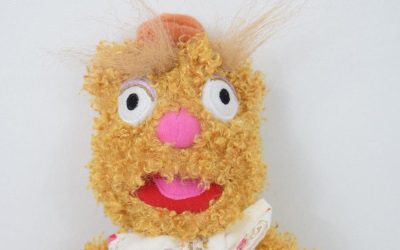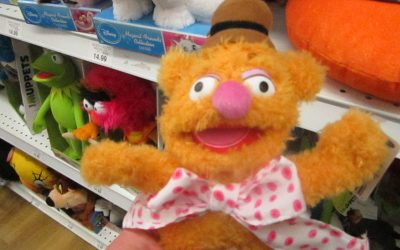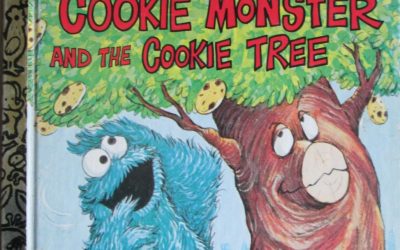Muppet Book Club
“The Case of the Missing Mother”
Click here to read the book!
Already We Have Issues
 Chris Smigliano:
Chris Smigliano:
I find it hard to believe that Animal would have any memory of a mother. I’ve always had the impression that he was totally feral, abandoned shortly after birth.
And Piggy having any kind fondness toward her mother? Oz’s backstory said they didn’t get along. I’m also amazed they played her sympathetic in this one; normally she would have said “WHO CARES?”
But, of course, with Muppet history filled with so many contradictions, who’s to say what’s gospel and what isn’t?
Hey, even with the Gospel, who’s to say what’s gospel and what isn’t?
Jogchem Jalink:
I think this story has the same sorta problems as Muppets From Space: too strong a character role for one of the crazier characters.

The story itself is a bit too short, too: The Muppets lose Animal. They find him almost immediately. They find his mother almost immediately. No clues, no hard time searching. Gonzo finds out he’s an alien. He comes to Piggy’s show. Singer catches him, and… oh, that’s the other story.
One of the main lessons I was taught as a dialogue writer was: “Picture your characters actually saying the words.” I don’t think some of the characters are actually saying their own words here, especially when they’re talking to Kermit.
For instance, Fozzie would either call him “Kermit” or “Sir” (when he’s nervous), but never “Kermit, sir.” And what’s up with Floyd calling him “boss”? Isn’t that Scooter’s line? Piggy is fine with me, but too sweet… and Animal kinda killed it with his “Moth-ther.” Come on, this is a Frank Oz character! What happened to “MOM-MY! MOM-MY!”
 Isha Matos:
Isha Matos:
I love the way that Animal screams “KILL!”
I think in today’s children’s books that would have been censored out.
Jim M:
Why do all the parents of the Muppets always look so old? I’ve always thought they end up looking more like grandparents. I just think that’s a bit odd.

Wallace in Rehab
Danny Horn:
The thing I really like about this book is the art. I miss the days of painted Muppet Show books. I think the picture on page 25 is really striking, with Animal reaching out of the van window. I also love the picture of everybody’s feet. Miss Piggy lifting up her muddy shoe in alarm is very effective.
Something that I like about Muppet books is they get to do some things that would be too expensive or difficult to do on the show, like go driving around town or show all the characters’ feet. You just don’t see a shot like that on TV, and it makes the characters look three-dimensional and real.
Something that’s weird about the art, which I also like in kind of a perverse way, is how the depiction of Miss Piggy is amazingly behind the times. Piggy stopped wearing that plain lavender dress around 1978, when she became a superstar and got her own wardrobe designer.
This book was published in 1983, by which point she’d appeared in The Great Muppet Caper, Miss Piggy’s Guide to Life, three popular calendars… At that point, the world was full of photos of Miss Piggy in thousands of different outfits and hairstyles, and with an updated face design. So why did William Cleaver choose to paint the 1978 model Piggy? It’s a mystery.
 Scott Hanson:
Scott Hanson:
Hey, I hadn’t picked up on that, but now that you mention it, yeah. How freaky.It’s like Cleaver stopped watching The Muppet Show in the middle of the second season, and based his Piggy on that.
I also love the page with all their feet, but I think my favorite shot is of Floyd on page 13 resting by the foot of the tree. I can just see Zoot on the other side of it, taking a nap with his hands folded, his legs outstretched in front of him, and his hat pulled down over his eyes. In fact, I think Floyd is my favorite drawn character in this book. Just something about the colors and shading used, and seeing him full body like that.
 Michal:
Michal:
I remember reading this book when I was little and hating that picture of all the shoes. I found it much more boring than the pictures with facial expressions. Although now that I’m all growed up and can experience the full artistic effect… Yeah, it’s pretty cool to see Happy Muppet Feet on occasion.
All in all, I think the illustrations were my favorite part of the book. Mostly I thought the dialogue and characters were over-simplified, although I loved those few Fozzie and Floyd lines that were right on target.
Did anyone else wonder why a LaVerne might name her kid “Animal”? I’d have thought that they’d move backward through the taxonomy, and maybe name Animal’s mother Vertebrate.
Scott Hanson:
I’m thinking Animal is just a nickname. Actually, it’s funny to think that LaVerne would be so simple as to name her kid Animal, but the conspiracy theorist in me is looking for deeper meaning to such things. I postulate that Animal has a real name that’s only been revealed on the lost back pages of some book/record set or illustrated panel somewhere waiting to be discovered by some freak like one of us.
It should be something like Irving or Wallace.

Ryan Roe:
I have this book. I remember my mom doing some of the voices when she read it aloud to my siblings.
The Oscar the Grouch cameo always delighted me, and it’s always weird to see Janice’s feet.
John Hamilton:
“The Case of the Missing Mother” made me realize that, when it comes to family, we should never take people for granted. Animal didn’t realize how much his moth-ther meant to him until he was spending time in a rather spartan Muppet rehab facility — one chair, one soft drink, chained to the wall. By then it was too late, as LaVerne, prone to denial and running away from her own family’s problems, had flown the coop.
Oh wait, he just lost her address? Never mind. I guess the lesson is to not lose addresses.
 As for LaVerne’s parenting skills: I think LaVerne, being a bohemian artist herself, gave Animal lots of room to grow as a child, and never made him feel tied to the home or her apron strings.
As for LaVerne’s parenting skills: I think LaVerne, being a bohemian artist herself, gave Animal lots of room to grow as a child, and never made him feel tied to the home or her apron strings.
This gave Animal, nee Irving or Wallace, the freedom to be the creative musician he is today in 1983. However, progressive parenting can also have its downside, as Animal frequently felt abandoned, lost, and completely alone in the world. It’s not a big surprise he turned to whatever landed him in Muppet Rehab.
Animal’s mother is a tad precious, don’t you think? The bows? Come on.
But I do appreciate the economy of the illustrations. Who knew Central Park had a fire station, bowling alley and train tracks, all in the same grassy area?
Stop Making Sense
 Danny Horn:
Danny Horn:
What’s the lesson of this book? “Missing Mother” seems like a less explicitly educational book than “Cookie Tree,” but there must be some underlying message for children that justifies why they wrote the thing in the first place.
I guess the message is that you should keep your mother on a short leash, because mothers tend to wander off if you take your eyes off them for a minute.
Or maybe: If your son hasn’t come to visit you for a while, don’t try to contact him; just sit around and wait for him to organize a search party.
Or, possibly: If you have a problem, make a big fuss about it — cry and scream, trash bowling alleys, dig holes in the ground — and all your friends will rally around and help you. I wish I’d read this book as a kid, I had to learn that lesson the hard way.

Chris Smigliano:
Why DID Animal bury his mother?
Seems like somebody told him he should put his mother IN a home, but instead he put her UNDER one.
Mike Cervantes:
And then she moved because of the movement of tectonic plates under the earth.
Michelle:
I was truly impressed by Animal’s “acting” in this book. His anguished facial expressions just made me feel so bad for him.
I wasn’t happy with how LaVerne looked; the bows were stupid. Perhaps if there was just one or two bows as opposed to a whole bunch of them.
How come she doesn’t need to be chained up? Sounds like Animal is a slave to the Man. If I were LaVerne, I’d beat up all the Muppets that kept my son chained up just so he could play in their band.
 Danny Horn:
Danny Horn:
The more that I think about it, I realize that this book simply does not hold up to a moment’s scrutiny. There’s not a single thing about it that makes logical sense.
Why does Janice think the pile of desk detritus in the place where the desk used to be is made of crumbs?
Why is the bowling alley on a dirt road, and why is it located in an unmarked garage?
Why does LaVerne use the “to be” verb in some sentences — “I will be living at” — and not in others — “Our house too big for me now”?
Why the hole? Why the broken chair? Why is Beauregard carrying a tree?
I think it’s possible that this book is a test, and we may be failing. There must be some higher purpose to it that we’re just not understanding with our puny minds. This book only makes sense in eight dimensions.

Where’s Wallace?
Julia Noomen:
Don’t like this book. I can’t really put my finger on it, but it just doesn’t appeal to me. It has no real message, it’s a bit too simple, and it’s definitely not exciting. Also, I don’t like the illustrations. I don’t like the colors, don’t like the style, and somehow everyone seems too long to me.
Animal escaped, and we see he broke his chains. Now, I can handle Animal being out of control and having chains around his neck and arms, but somehow that seemed sort of rock and roll to me. Being confronted — in a children’s book! — with an Animal that is always chained to the wall of his room somehow frightened and saddened me.
To make matters even worse, the simple story is FULL of plotholes. It is rather convenient that Animal lost the last line of his mom’s letter — where did that go? Did he tear it off himself? Sherlock Hemlock’s better go and find the person who tried to sabotage Animal’s family reunion by tearing off that piece of address.
Also, if Animal’s mom values their family bond that much, why doesn’t she look him up more often? She knows where he is, after all. Which leads me to believe that maybe Mom tore off that last piece of paper herself before she sent it out to Animal, because she wouldn’t want to be found. Which would also make a much more interesting story…
 Tom Holste:
Tom Holste:
I never really wanted to know about Animal’s mom. I think Animal and his family are just completely wild, never thinking about each other, but totally happy. Reading this book, I actually felt depressed for Animal for the first time, and it was an icky feeling. I didn’t want to read about this traumatic incident in his life any more than I’d want to read about the Swedish Chef going through a messy divorce or the Muppet Newsman losing his home.
And what is it with children’s story authors being so obsessed with lost/enstranged/dead parentage? At the author’s age in life, it’s probably a big deal, and if you’re a kid from a broken family, maybe books like these are helpful. But when I was a kid, I was concerned about playing with my toys, wondering whether other kids on the schoolground liked me, and homework. I wasn’t the least concerned with finding my cultural heritage, as books/stories/Disney films would have you think.
 Danny Horn:
Danny Horn:
I don’t know if it’s an obsession with estranged parents here as much as an obsession with finding something that’s lost.
Along with “The Case of the Missing Mother,” there’s also “The Case of the Missing Hat” with Fozzie and Robin, a Sesame book called “The Case of the Missing Rubber Duckie,” and a story in the Sesame ABC Storybook called “The Case of the Missing Letter.”
Finding something that’s lost probably is a big issue for toddlers; they lose stuff all the time. The fact that in this case it’s a Mom instead of an object just ups the stakes.
Isha Matos:
I lost my glasses. I put them on the bedside table, and the next morning they were gone. So I’m stuck wearing an old prescription. Which brings me to my question: Why do they always call these things “The Case of the Missing…”
I mean, unless these books actually include a detective, or they make reference to some kind of detective work, it seems kind of silly. I’m not going around saying, “Oh, it’s the case of the missing glasses!”
 Tom Holste:
Tom Holste:
Good question — except in my case, of course. If I realize something is missing, whether I’m all by myself or in a crowded public place, I immediately declare, “It’s the case of the missing ——-!” I then put on my Sherlock hat and begin walking around looking for the object with a large eyeglass. Sometimes I’ve just lost my pen on my desk and I find it again in two seconds, but overall I find the process to be quite useful. The eyeglass is also helpful, even if I’m in a parking lot and can’t remember where I parked my car.
Why do I do this? Because I always do what my Sesame Street and Muppet books tell me.
Ryan Roe:
Believe it or not, when I went to my parents’ house to look for my old copy of “The Case of the Missing Rubber Duckie,” I couldn’t find it.
So I should write a book called “The Case of the Missing ‘The Case of the Missing Rubber Duckie’.”

 Something that I like about Muppet books is they get to do some things that would be too expensive or difficult to do on the show, like go driving around town or show all the characters’ feet. You just don’t see a shot like that on TV, and it makes the characters look three-dimensional and real.
Something that I like about Muppet books is they get to do some things that would be too expensive or difficult to do on the show, like go driving around town or show all the characters’ feet. You just don’t see a shot like that on TV, and it makes the characters look three-dimensional and real.

